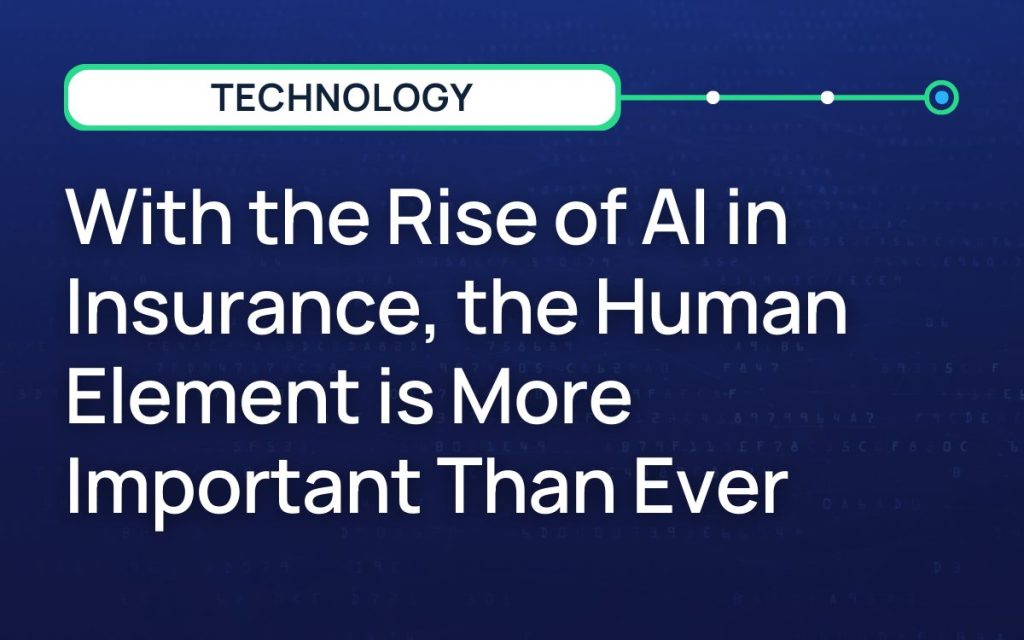With the Rise of AI in Insurance, the Human Element is More Important Than Ever

ChatGPT may be able to whip out a love poem on demand, but consumers know the value of an expert human on their team for things that really matter.
There’s no denying that the digital age is upon us. The insurance industry has experienced sweeping changes, none more visible than the transformations we’ve seen since the start of COVID-19. Many of these changes have to do with advances in AI and consumer preferences in insurance, both within insurance carriers and agencies and in relation to consumer interactions and purchases.
Television and online ads would have you believe that the most popular way to buy insurance is instantly from a mobile device, without so much as talking to another human. However, perception isn’t always reality. While AI in insurance provides speed and convenience, it can sometimes overlook individuals’ and businesses’ nuanced needs and personal circumstances.
This is where human interaction becomes not just beneficial, but crucial. In fact, recent studies and consumer opinion surveys have shown an uptick in consumers’ preference for human interaction during the insurance purchasing process compared to prior years. Despite our addiction to technology and instant gratification, people still value the guidance, personalized service, and reassurance that only another human can provide when they’re making important decisions like buying insurance.
The choice between AI and working with a live insurance broker matters
There’s no doubt that self-service insurance purchasing options, including those powered by conversational AI for insurance, benefit consumers. And there are lots of examples of when a consumer can sufficiently meet their own needs with a website or app, and even by using AI robot chat (aka a chatbot) to get some questions answered before they make a buying decision.
What’s most important to customer satisfaction, however, is the choice to connect with a live person when they want to. People have a large spectrum of insurance needs. From the initial shopping and purchasing decision to servicing a policy throughout the year to filing a claim, each type of interaction comes along with individual preferences for how to do it.
So, while technology is an important enablement tool (and we’ve written plenty about the modern consumer’s demand for a quick, efficient, and tech-forward user experience), the choice to speak with an expert human when they want to is equally as important.
According to a study by Accenture, 49 percent of insurance consumers want to speak with a human advisor when they need to file a claim. Only 12 percent would choose to file a claim with an automated service like an online portal, and still fewer (7 percent) would initiate an insurance claim with a chatbot.
Real world experience and survey results both point to the fact that it’s the choice, and consumers’ ability to make the choice that’s right for them, that’s important: not just whether a company provides a website or app.
The type of policy and its cost also matter to consumers
Not all insurance policies are created equal. The price and complexity of the policy, and the level of benefits at stake, absolutely factor into consumers’ preferences on how to buy. On an individual level, people may be very willing to buy a renter’s insurance policy or a pet insurance policy, both of which might range from 15 to 30 dollars a month, without speaking to anyone about it first.
Consumers prefer tech when buying personal lines of insurance
It’s incredibly easy to get personal lines of insurance like home and auto nearly instantly and through a self-service online portal or in an app. Even though home and auto policies are a bit more complex than travel insurance or mobile phone insurance, people still largely feel confident that they’re equipped to buy those products directly from carriers, without a licensed agent to guide them. In 2021, the Insurance Information Institute (III) reports, 65.4 percent of net premiums on personal lines came through direct transactions with insurers.
The exception, when it comes to personal lines, may be larger decisions and those with more complicated policies and multiple options, like life insurance, health insurance, annuities, and even Medicare and Medicare supplements. Accenture’s study shows evidence that the magnitude of the purchasing decision makes a difference in consumers’ preference for seeking out a licensed agent or broker. The more policies they need, the more expensive the policies are, and the more they have at stake if they choose the wrong policy, the more likely a consumer is to seek out a licensed agent or broker.
Further evidence for this is in the III’s report that in 2021, 89 percent of all life insurance purchases came through agents (both independent and affiliated or captive agents). That’s a stark contrast to statistics on other personal lines. Private passenger auto insurance, for example, only earned 33.3 percent of its 2021 net premiums via the agency channel.
The bottom line is that consumers may demand self-service insurance purchasing capabilities for inexpensive and simple policies and also still show a strong preference for a licensed agent or broker for larger and more expensive policies.
Business insurance purchases are more likely to come through agents
One of the biggest indicators of the preference for an expert human advisor, like a licensed producer or a dually licensed broker, is whether the type of insurance is personal or commercial lines. According to III, only 34.5 percent of net personal lines premiums in 2021 were written by an agent. Compare that to 76.8 percent of commercial lines P&C insurance that agents wrote in the same year. Stats like these back up sentiments from insurtech leaders like AgentSync’s Niji Sabharwal that, “The percentage of premium written by producers isn’t in decline.”
Insurance agents, brokers, and producers will only become stronger by adding technology into the mix
Every source we can find agrees on one thing: Finding the right combination of personal touches and digital tools will be the key to getting and keeping insurance consumers in the coming years.
Insurers and agencies that don’t provide customers with a baseline level of technology will be left behind as Millennials and Gen Z become the largest segment of overall consumers; 137 million strong. At the same time, the evidence shows that, particularly for large and complex insurance needs, most people still want as close as they can get to speaking face-to-face with a trusted insurance advisor.
We predict licensed insurance agents, brokers, and producers aren’t going anywhere. They certainly won’t be replaced by AI robot customer service. Rather, these vital roles should strategically use technology to help them do more, both better and faster.
Empower agents to meet your customers’ digital needs
As the workforce of licensed insurance producers and brokers continues to shrink and trend younger thanks to a mass retirement wave, the remaining producers will be responsible for a larger proportion of each agency’s and carrier’s book of business.
To succeed at their jobs, producers will need to be technologically equipped to do more with less. This means being ready to sell more quickly and spending less time (or none!) on manual, tedious tasks like managing their license compliance and continuing education status.
By setting agents up for this kind of operational efficiency, insurers and insurance agencies will reap the benefits of having their expert human insurance staff ready and able to help clients when they choose to seek out a human partnership, rather than tied up with paperwork and tedium.
See how AgentSync can make this a reality at your insurance business today. Get in touch to talk about your specific situation. Just like you, we’ve got actual humans ready to help.

